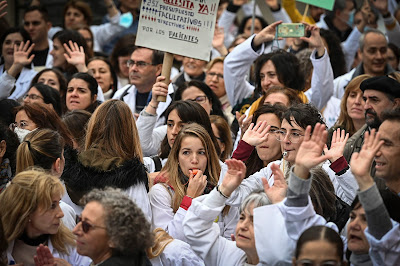Primera semana de huelga de médicos de familia y pediatras de Atención Primaria de Madrid. En mi caso servicios mínimos cubriendo las necesidades de mi pueblo en turno de mañana en solitario. Más de lo mismo. En el caso de mis compañeros en centros grandes dos mínimos por turno con bastante seguimiento. En el caso de la mesa negociadora: bloqueo.
En general estamos todos bloqueados de pensamiento, palabra, obra y omisión. De pensamiento porque las posturas son alejadísimas. Por un lado la administración defiende que su gestión es impecable pero basta ver un vídeo de la presidenta de la Comunidad de hace unos años prometiendo el oro y el moro para ver que no se ha cumplido mucho de lo dicho. Por otro lado el sindicato que defiende la huelga pidiendo presupuesto y menos sobrecarga que pese al enorme apoyo de los facultativos no dispone de un plan de implementación de mejoras mientras no haya más recursos
Necesitamos mediadores. No se imaginan cómo, dado que el problema de las sanidades públicas europeas es complejo, la española la más débil y la Atención Primaria es el canario de la mina.
Hacen falta recursos, sí. Eso requiere que los grupos propongan avances en sus programas electorales y se lo tomen en serio. También que de una vez se implementen políticas a nivel nacional que defiendan los recursos humanos sanitarios de este país para que no se sigan dañando más y migrando cuando puedan.
También hacen falta otras cosas. Si asumimos que el modelo está enfermo quizá sea tiempo de ensayar alternativas que vayan en la dirección de la autogestión de equipos pequeños. Quizá podamos abrir la puerta a médicos extracomunitarios para cubrir plazas de difícil cobertura, de refuerzo o de los puntos de atención continuada que están vacíos. Quizá podamos abrir la mano para reformar y potenciar la enfermería de Atención Primaria permitiendo que avance la prescripción enfermera de un catálogo de fármacos básicos que facilite la gestión de problemas de salud leves que acuden sin cita al centro de salud.
El problema principal, como digo, es el bloqueo. Cada colectivo sanitario tiene sus intereses y sus representantes sindicales los priorizan sin atender al bien común. Tampoco se ha conseguido de momento crear foros o plataformas que aúnen la voz de los distintos profesionales y velen por el bien de todos. Por eso la administración no puede tener una hoja de ruta creíble, eligiendo el camino a trompicones según las dificultades que se encuentren. Imaginen si esto ocurriese en un barco… en este momento son los remeros los que gritan, por tener consultas que doblan o triplican en muchos casos los pacientes que atienden médicos de familia en otros países, especialistas de hospital o directamente la enfermera de la consulta de al lado. Pero puestos a gritar todo el mundo sabe y en algún momento lo termina haciendo. ¿Tendrá la Consejería sabiduría para discernir el peso de los mismos o actuará en función de criterios electoralistas?, ustedes lo intuyen como yo.
Lo que quizá no sepa el ciudadano medio es que el daño que pediatras y médicos de familia llevamos en el cuerpo desde la pandemia es inmenso, por que ya veníamos tocados de antes. Un daño que hace que la mayoría esté tomando psicofármacos para aguantar o esté yendo a terapia o buscando ayuda. Esto no había pasado antes a este nivel. Son muchos años de sobrecarga infumable en los que hemos ido viendo como los pocos suplentes que había o los escasos refuerzos en zonas rurales en verano se volatilizaban.
Y lo peor de todo es que los responsables lo saben. Los gestores saben lo que está pasando con los residentes que abandonan la especialidad de Medicina de Familia o se van a otros lugares. Conocen el nivel de malestar y dolor de los centros más sobrecargados. Conocen la cantidad de médicos enfermos por este motivo. Conocen que en cinco años se jubilará un 25% de la plantilla facultativa. Pero miran al suelo, a las siguientes elecciones, no más allá. Y a los directivos que se atreven a hacerlo se los cargan, basta mirar la lista de dimisiones de los últimos años que es muy ilustrativa. Hay una responsabilidad en el aparato de gestión de la Atención Primaria, cientos de puestos de trabajo que no están defendiendo a sus hermanos asistenciales. Hay una responsabilidad en el nivel de alta gestión que asume sin chistar lo que les impone el político de turno sin establecer líneas rojas. Hay una responsabilidad en los políticos cuyo discurso es “bajar impuestos” en lugar de priorizar la gestión de los mismos o “libertad” en lugar de defender el acceso a la misma. Y hay una responsabilidad en el ciudadano a la hora de exigir una sanidad digna a sus representantes. Habrá que hacerlo saliendo a la calle, mandando cartas, yendo a hablar con alcaldes o partidos, organizándose en los barrios, informándose de lo que pasa en su localidad, y por supuesto a la hora de votar.
Para sacar a un paciente de una parada cardiaca hay que hacer cosas. No nos podemos quedar bloqueados mientras se apaga. Aquí pasa lo mismo, y ya van muchos años avisando, el paciente tiene ya mal color.
The blockade
First week of strike of family doctors and paediatricians in Primary Care in Madrid. In my case, minimum services covering the needs of my town in the morning shift alone. More of the same. In the case of my colleagues in large centres, two minimums per shift with a good following. In the case of the negotiating table: deadlock.
In general we are all blocked in thought, word, deed and omission. In thought because the positions are very far apart. On the one hand, the administration defends that its management is impeccable but it is enough to see a video of the president of the Community from a few years ago promising the gold and the silver lining to see that not much of what was said has been fulfilled. On the other hand, the union that defends the strike asking for a budget and less overload, despite the enormous support of the doctors, does not have a plan to implement improvements while there are no more resources.
We need mediators. You can't imagine how, given that the problem of European public health is complex, the Spanish one is the weakest and primary care is the canary in the mine.
Resources are needed, yes. This requires the groups to propose advances in their electoral programmes and to take it seriously. It also requires policies to be implemented at the national level that defend the human resources for health in this country so that they do not continue to be damaged and migrate when they can.
Other things are also needed. If we assume that the model is sick, perhaps it is time to try alternatives that go in the direction of self-management of small teams. Perhaps we can open the door to non-EU doctors to fill hard-to-fill positions, reinforcement positions or vacant points of continuous care. Perhaps we can open our hands to reform and strengthen primary care nursing, allowing the nurse prescription of a catalogue of basic drugs to make it easier to manage minor health problems that come to the health centre without an appointment.
The main problem, as I say, is the blockage. Each health collective has its own interests and their union representatives prioritise them without considering the common good. Nor has it so far been possible to create forums or platforms that bring together the voices of the different professionals and look after the good of all. This is why the administration cannot have a credible roadmap, choosing its path in fits and starts according to the difficulties encountered. Imagine if this were to happen on a boat... at the moment it is the rowers who are shouting, because they have consultations that in many cases double or triple the number of patients seen by family doctors in other countries, hospital specialists or even the nurse in the consulting room next door. But everyone knows how to shout and at some point ends up doing so. Will the Regional Ministry be wise enough to discern the weight of these or will it act according to electioneering criteria, you can sense it as well as I can.
What the average citizen may not be aware of is that the damage that paediatricians and family doctors have been carrying in their bodies since the pandemic is immense, because we were already affected beforehand. This damage means that most of us are taking psychotropic drugs to cope or are going to therapy or seeking help. This has never happened before at this level. There have been many years of unbearable overload in which we have seen how the few substitutes we had or the scarce reinforcements in rural areas in the summer have gone up in smoke.
And the worst thing is that they know it. The managers know what is happening with the residents who abandon the speciality of Family Medicine or go elsewhere. They know the level of discomfort and pain in the most overburdened centres. They know the number of doctors who are sick for this reason. They know that in five years 25% of the medical staff will retire. But they look to the ground, to the next elections, not beyond. And the managers who dare to do so are being killed, just look at the list of resignations in recent years, which is very illustrative. There is a responsibility in the management apparatus of Primary Care, hundreds of jobs that are not defending their care brothers. There is a responsibility at the senior management level who unquestioningly accept whatever the politician of the day imposes on them without drawing any red lines. There is a responsibility on the politicians whose discourse is "lower taxes" instead of prioritising tax management. And there is a responsibility on citizens to demand decent healthcare from their representatives. They will have to do so by taking to the streets, sending letters, going to talk to mayors or parties, organising in the neighbourhoods, informing themselves about what is happening in their locality, and of course when it comes to voting.
To bring a patient out of cardiac arrest you have to do things. We can't just stand by while he or she shuts down. The same thing happens here, and we have been warning for many years, the patient already has a bad colour.
封锁
马德里初级保健的家庭医生和儿科医生罢工的第一周。就我而言,仅在早班时,最低限度的服务就能满足我镇的需求。更多相同的情况。就我在大型中心的同事而言,每班至少有两个人,有很好的追随者。在谈判桌的情况下:僵局。
一般来说,我们都在思想、言语、行为和不行为方面受到阻碍。在思想上,因为双方的立场相差甚远。一方面,政府为其管理无懈可击进行辩护,但只要看看几年前共同体主席承诺的黄金和银线的视频,就足以看出所说的大部分内容并没有得到实现。另一方面,为罢工辩护的工会要求提供预算和减少超负荷工作,尽管得到了医生的巨大支持,但只要没有更多的资源,就没有实施改进的计划。
我们需要调解员。你无法想象,鉴于欧洲公共卫生的问题是复杂的,西班牙的问题是最薄弱的,而初级保健是矿井中的金丝雀。
需要资源,是的。这就要求各团体在其选举方案中提出进步,并认真对待。它还要求在国家层面上实施政策,捍卫这个国家的卫生人力资源,使他们不会继续受到损害,并在有能力的情况下进行迁移。
还需要其他东西。如果我们认为这种模式是病态的,也许现在是时候尝试替代方案,朝着小团队自我管理的方向前进。也许我们可以向非欧盟国家的医生敞开大门,以填补难以填补的职位、增援职位或空缺的连续护理点。也许我们可以张开双手,改革和加强初级保健护理,允许护士提前开出基本药物目录,以方便管理那些没有预约就来到保健中心的小健康问题。
如我所说,主要问题是堵塞。每个卫生集体都有自己的利益,他们的工会代表优先考虑这些利益而不考虑共同利益。到目前为止,也不可能创建论坛或平台,将不同专业人员的声音汇集在一起,照顾所有人的利益。这就是为什么政府不能有一个可信的路线图,而是根据遇到的困难来选择自己的道路。想象一下,如果这发生在船上......目前是划船者在喊,因为他们的咨询量在很多情况下是其他国家的家庭医生、医院专家甚至是隔壁咨询室的护士的两倍或三倍。但每个人都知道如何喊话,并且在某些时候最终会这样做。 地区部是否会有足够的智慧来辨别这些东西的分量,还是会按照选举标准行事,你和我一样都能感觉到。
普通市民可能不知道的是,自大流行以来,儿科医生和家庭医生身体里背负的伤害是巨大的,因为我们事先已经受到了影响。这种损害意味着我们中的大多数人正在服用精神药物来应对,或者正在接受治疗或寻求帮助。在这个级别上,这种情况以前从未发生过。已经有许多年的超负荷工作让人难以忍受,在这些年里,我们看到我们为数不多的替补队员或夏季农村地区稀缺的增援人员是如何化为乌有的。
而最糟糕的是,他们知道这一点。管理人员知道那些放弃全科医学专业或去其他地方的居民的情况。他们知道负担最重的中心的不适和痛苦程度。他们知道有多少医生因为这个原因而生病。他们知道,五年后,25%的医务人员将退休。但他们着眼于地面,着眼于下次选举,而不是超越。而敢于这样做的经理人都被干掉了,看看近几年的辞职名单就知道了,这很能说明问题。在初级保健的管理机构中,有一种责任,数以百计的工作没有为他们的护理兄弟辩护。在高级管理层有一种责任,他们毫不怀疑地接受当时的政治家强加给他们的任何东西,而不划定任何红线。政治家们有责任,他们的话语是 "降低税收",而不是优先考虑税收管理。而公民有责任要求他们的代表提供体面的医疗服务。他们必须通过上街、寄信、与市长或政党交谈、在社区组织活动、了解当地发生的情况,当然还有投票。
要使病人脱离心脏骤停,你必须做一些事情。我们不能在他或她关机时袖手旁观。同样的事情发生在这里,我们已经警告了很多年,病人已经有了不好的颜色。
.jpg)
.jpg)
.jpg)

.jpg)
.jpg)











.png)


.jpeg)


